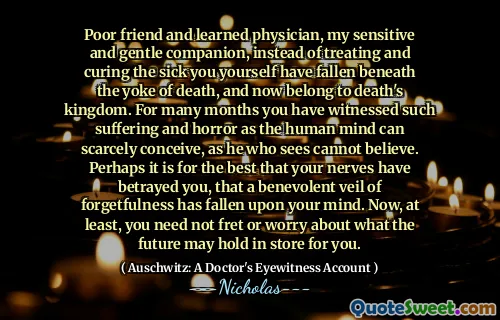Miklós Nyiszli was a Jewish doctor who became infamous for his role as a pathologist in the Auschwitz concentration camp during World War II. After being interned there with his family in 1944, he was forced to assist Dr. Josef Mengele, who conducted inhumane experiments on inmates. Throughout this harrowing experience, Nyiszli documented various medical procedures and the horrific conditions faced by the prisoners. His writings provide a poignant insight into the atrocities of the Holocaust and the moral dilemmas faced by those who were coerced into collaboration.
Although Nyiszli's medical expertise afforded him some privileges within the camp, it came at a terrible cost. He witnessed unimaginable suffering and was often torn between his role as a doctor and his sense of humanity. His commitment to documenting the events around him can be seen as both a means of survival and an effort to ensure that the truth of the Holocaust would not be forgotten. His accounts are stark reminders of the complexities of human behavior in times of despair.
After the war, Nyiszli's writings became a critical resource for understanding the Holocaust from a medical and ethical perspective. He struggled with survivor’s guilt and the moral implications of his role, reframing his experiences through the lenses of trauma and responsibility. His work has been both criticized and praised, yet it remains an essential testament to the resilience and suffering of individuals during one of history's darkest chapters.
Miklós Nyiszli was a Jewish physician best known for his harrowing experiences as a doctor in the Auschwitz concentration camp. Initially interned in 1944, he was compelled to work alongside the infamous Dr. Josef Mengele, where he participated in horrific medical experiments on fellow prisoners. Nyiszli’s poignant writings offer a chilling account of the atrocities and moral conflicts encountered during this time.
Despite the privileges that came with his position, Nyiszli found himself battling with ethical dilemmas as he documented the suffering around him. His accounts serve as a sobering reminder of the struggles faced by those forced into complicity, as he grappled with the balance between his medical duties and basic humanity. Through his detailed observations, he not only ensured a historical record but also showcased the deep psychological scars left by these experiences.
Post-war, Nyiszli’s writings provided critical insights into the intersection of medicine and moral responsibility during the Holocaust. He faced survivor’s guilt and wrestled with the implications of his actions, offering reflections on trauma and its impact. His work continues to be a vital resource for understanding the ethical challenges posed by extreme circumstances, making his legacy an important part of Holocaust literature.
